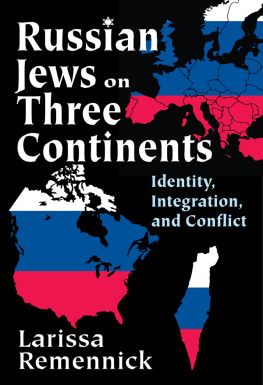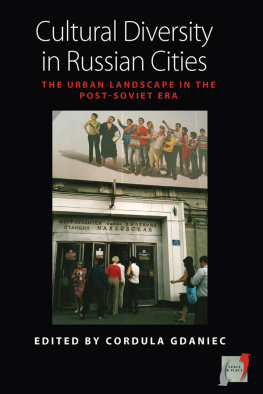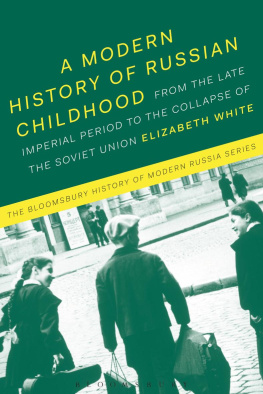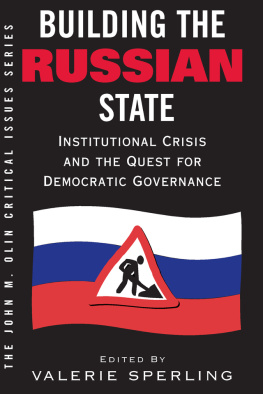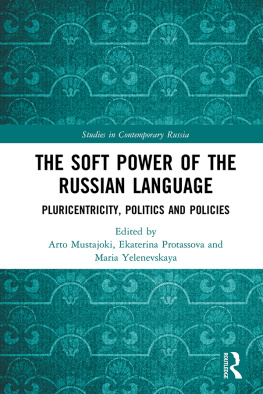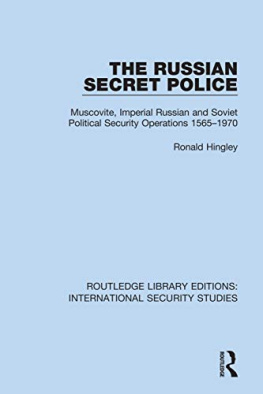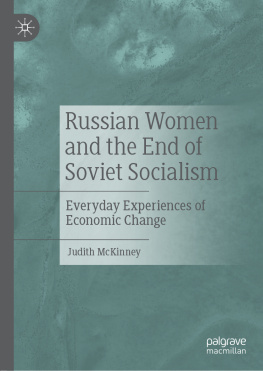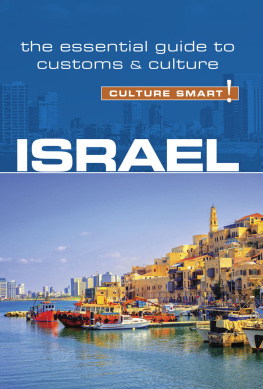Russian Israelis
Israelis with a Russian accent have been part of Israels social, cultural and economic landscape for over 20 years. They are found in all walks of life: as controversial politicians, senior physicians and scientists, kibbutz members and religious settlers. Despite lacking personal assets and below-average income, many of them managed to enter Israeli middle class, and some even became part of local elites an achievement not to be taken for granted for the first-generation immigrants. This collection offers a multifaceted portrait of the Great Russian Aliyah of the 1990s with the emphasis on sociopolitical and cultural aspects of its insertion in Israel based on social research conducted by the scholars most of whom are former-Soviet immigrants themselves. The issues covered include the exploration of Israel as an extension of the post-soviet space; the evolving political culture of Russian Israelis; the prospects for the ethnic media and Russian language continuity; visual tokens of domestication of a major Israeli city by its Russian residents, and mutual influences between Israeli and Russian cinematic traditions. Written in a lively and non-technical manner, most contributions will spark interest among both social scientists and broad readership interested in modern-day Israel and post-Soviet societies.
This book was originally published as a special issue of Israel Affairs.
Larissa Remennick is Professor of Sociology at Bar-Ilan University in greater Tel-Aviv, Israel. She was born and educated in Moscow, Russia (PhD from USSR Academy of Sciences, 1988) and immigrated to Israel in 1991. Her research interests include immigration, integration and ethnic relations in general, as well as Jewish identity, emigration and Russian-Jewish global diaspora specifically. She is author of Russian Jews on Three Continents: Identity, Integration, and Conflict (2007).
Russian Israelis
Social Mobility, Politics and Culture
Edited by
Larissa Remennick
First published 2012
by Routledge
2 Park Square, Milton Park, Abingdon, Oxon, OX14 4RN
Simultaneously published in the USA and Canada
by Routledge
711 Third Avenue, New York, NY 10017
Routledge is an imprint of the Taylor & Francis Group, an informa business
2012 Taylor & Francis
This book is a reproduction of Israel Affairs, volume 17/issue 1. The Publisher requests to those authors who may be citing this book to state, also, the bibliographical details of the special issue on which the book was based.
All rights reserved. No part of this book may be reprinted or reproduced or utilised in any form or by any electronic, mechanical, or other means, now known or hereafter invented, including photocopying and recording, or in any information storage or retrieval system, without permission in writing from the publishers.
Trademark notice: Product or corporate names may be trademarks or registered trademarks, and are used only for identification and explanation without intent to infringe.
British Library Cataloguing in Publication Data
A catalogue record for this book is available from the British Library
ISBN13: 978-0-415-69696-8
Disclaimer
The publisher would like to make readers aware that the chapters in this book are referred to as articles as they had been in the special issue. The publisher accepts responsibility for any inconsistencies that may have arisen in the course of preparing this volume for print.
Larissa Remennick
Department of Sociology, Bar-Ilan University, Israel
Two decades have elapsed since the inception of the Great Aliya1 of Russianspeaking Jews to Israel in the wake of the deterioration and ultimate demise of the Soviet empire. The arrival of about one million former Soviets between 1989 and 2000 was the single largest wave of immigration in Israels history and has redrawn the economic, social and political landscape of the country in multiple ways. Anniversaries create a momentum for individual and collective reflections about the meaning of the formative events in contemporary history. There is little doubt that the mass exodus of Soviet Jews (and their non-Jewish relatives) from Russia, Ukraine and other parts of the USSR/FSU in the late twentieth century has played a pivotal role in modern Jewish history. It has had multiple ramifications for the sending countries and their remaining Jewish communities, prone to ageing and rapid assimilation. The demographic decline of former Soviet Jewry, probably going extinct in future decades despite active attempts to revive Jewish community life in the Former Soviet Union (FSU), is beyond the scope of this volume.2 Our main focus is on the receiving end of this emigration wave, i.e. the encounter between ex-Soviet Jews and their new homelands. Since Israel became the final destination for some 5560% of the 1.6 million Jewish migrs of the 1990s (with some 30% going to North America and 1015% to Europe and Oceania), it has effectively emerged as the largest island of the global Russian-Jewish Diaspora.3
While in the host countries of the West Russian Jews comprise a small and politically-insignificant minority among other immigrants, in Israel they have enlarged the Jewish population by almost 20% nationally and form over half of the residents in many localities. The critical mass of this immigration combined with its high human capital (over 50% having higher education) and immediate access to full citizenship rights meant that Russian Israelis could make, and have actually made, a significant impact on the political and social outcomes in the ongoing process of Israels nation-building. Since the early 1990s, the Russian vote has shaped the Knesset and governmental coalitions; the ubiquitous presence of the Russian language and cultural institutions in the public arena spearheaded the de facto deference to multiculturalism; the secular lifestyle of most former Soviet Jews and a high share of non-Jewish or partly Jewish immigrants compelled Israeli public and mass media (but not the Orthodox rabbinical establishment!) to re-define the very boundaries of acceptable Jewish identities. Today, there is little doubt that Russian Jews have fortified Israel via their contributions to the Jewish population (especially its secular sector), economy, education, culture and the military. Yet at the same time their very presence, political/civic activism and persistent attachment to the Russian culture (instead of rapid Israelization) have introduced new points of contention in the Israeli discourse. By contrast to mass Mizrahi Aliya of the 1950s, Russian immigrants of the 1990s proved ready to resist the demands of instant absorption and were able to set their own terms of entry into Israeli mainstream. Despite the language gap and limited economic opportunity that awaited them in the new country, they refused to settle in the geographic and social periphery of Israel and boldly claimed their place in the Ashkenazi middle class.4
The encounter between the Russian newcomers and the Hebrew mainstream has been coloured by cultural conflict and mutual social alienation. In many ways, Russians failed to meet the expectations of the old-timers, being more pragmatic than Zionist and more Russian than Jewish in their lifestyle and demeanour. Indeed, Russian Olim of the 1990s are more diverse than their ideologically-driven and rapidly integrated predecessors who came in the 1970s. They are also more critical of Israel and find it lacking in many respects, often building their own networks and institutions instead of joining the existing ones (particularly in education and culture). The left-leaning Ashkenazi establishment was disappointed to discover the predominant centre-right and often hawkish political mindset of Russians. The highly visible and controversial figures, particularly politicians (such as Avigdor Liberman, Foreign Affairs minister in the Netanyahu cabinet when I am writing these lines) and financial moguls (such as Arkady Gaidamak who purchased the


